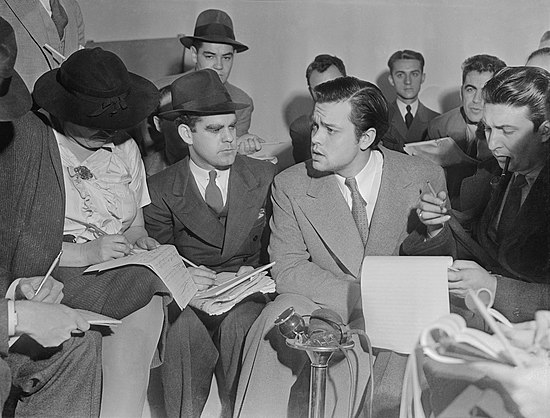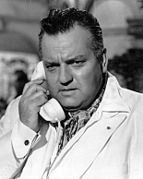Talk:Orson Welles
| This is the talk page for discussing improvements to the Orson Welles article. This is not a forum for general discussion of the article's subject. |
Article policies
|
| Find sources: Google (books · news · scholar · free images · WP refs) · FENS · JSTOR · TWL |
| Archives: Index, 1 |
| This It is of interest to the following WikiProjects: | |||||||||||||||||||||||||||||||||||||||||||||||||||||||||||||||||||||||||
| |||||||||||||||||||||||||||||||||||||||||||||||||||||||||||||||||||||||||
Proposed infobox image change
[edit]How about an infobox image change for Orson Wells since the current one is in his early twenties. Anybody thinks it needs a change?
-
Option 1
-
Option 2
-
Option 3
-
Option 4
-
Option 5
Cast your votes here 113.211.210.70 (talk) 16:56, 15 July 2023 (UTC)
- No, the infobox image does not need a change. It is a quality image of long standing in this article. See Talk:Orson Welles/Archive 1#Infobox image. — WFinch (talk) 23:05, 26 August 2023 (UTC)
- No, infobox is fine. -also, he didn't always wear a mustache. (option 3 does not look like him.) Manannan67 (talk) 00:25, 3 September 2024 (UTC)
- How about doing this color image from 1939, around the same time. I highly prefer this objectively better image that is even in color and is super high quality. What do you guys think?
- Put this color image in from 1939 because I strongly believe it is the best option. It is objectively the best, probably the highest quality and in color. Wcamp9 (talk) 21:45, 3 October 2024 (UTC)
- I have no problem with the current image. - FlightTime (open channel) 22:22, 3 October 2024 (UTC)
- Note: Color images of older "dead" famous people is Not better. - FlightTime (open channel) 22:24, 3 October 2024 (UTC)
- How is it not, just because they are dead does not mean we should go for the highest quality Wcamp9 (talk) 00:20, 4 October 2024 (UTC)
- Should we change it Wcamp9 (talk) 00:21, 4 October 2024 (UTC)
- Note: Color images of older "dead" famous people is Not better. - FlightTime (open channel) 22:24, 3 October 2024 (UTC)
Featured picture scheduled for POTD
[edit]Hello! This is to let editors know that File:Orson Welles War of the Worlds 1938.jpg, a featured picture used in this article, has been selected as the English Wikipedia's picture of the day (POTD) for May 6, 2025. A preview of the POTD is displayed below and can be edited at Template:POTD/2025-05-06. For the greater benefit of readers, any potential improvements or maintenance that could benefit the quality of this article should be done before its scheduled appearance on the Main Page. If you have any concerns, please place a message at Wikipedia talk:Picture of the day. Thank you! — Amakuru (talk) 11:24, 5 December 2023 (UTC)

|
|
George Orson Welles (May 6, 1915 – October 10, 1985) was an American actor, director, screenwriter, and producer who is remembered for his innovative work in film, radio, and theatre. Poster credit: Acme News Photos
Recently featured:
|
Welle's (very quentionable) claims
[edit]"Within three weeks, newspapers had published at least 12,500 articles about the broadcast and its impact, but the story dropped from the front pages after a few days. Adolf Hitler referenced the broadcast in a speech in Munich on November 8, 1938. Welles later remarked that Hitler cited the effect of the broadcast on the American public as evidence of 'the corrupt condition and decadent state of affairs in democracy'."
http://en.wiki.x.io/wiki/The_War_of_the_Worlds_(1938_radio_drama)#Public_reaction
"The myth of the result created by the combination was reported as fact around the world and disparagingly mentioned by Adolf Hitler in a public speech. [...] During a 1970 appearance on The Dick Cavett Show, Welles claimed to have met Hitler while hiking in Austria with a teacher who was a 'budding Nazi'. He said that Hitler made no impression on him at all and does not remember him. He said that he had no personality at all: 'He was invisible. There was nothing there until there were 5,000 people yelling sieg heil'."
WELLES: I think that’s the nicest thing that a man from England could say about the men from Mars. Mr Hitler made a good deal of sport of it, you know, and actually spoke of it in the great Munich speech. And there were floats in Nazi parade showing —
WELLS: He hadn’t much else to say.
WELLES: That’s right! (laughter) And it’s supposed to show the corrupt condition and decadent state of affairs in democracies that The War of the Worlds went over as nice as it did.
This obviously stems exclusively from the self-promoting imagination of the Kenosha-born “showman” Wells, who was a generation (26 years) younger than Hitler. For Hitler demonstrably did not give a speech in Munich the day before the so-called Kristallnacht, but was very probably in Berlin. Neither in German nor in English is there any reference on the entire Internet to a speech by Hitler in Munich's Bürgerbräukeller on November 8, 1938.
https://archive.org/details/tcahs/page/n1173/mode/2up
Exactly one year later, however, he gave a speech in the Bürgerbräukeller, in which he did not mention the word decadence or corruption at all, let alone Well(e)s ridiculous “panic radio play about Martians”. He uses the word America once, in the sentence: “After all, this Germany has had more suicides in two years than Americans have died in the West in the middle of the war.”
https://www.georg-elser-arbeitskreis.de/texts/hitler-1939-11-08.htm
It was the speech in which eight people were killed by Georg Elser's bomb attack, according to the protocoll 20 (not "13") minutes after Hitler had left the scene. Equally truthful is Wells' statement that he once “sat right next to Hitler” in the Tyrol, only to attest to his “lack of personality” 35 (?) years later. I doubt with great emphasis that this guy was ever even close to Hitler, who was indeed “invisible”: because he was physically non-existent (except in the imagination of the fame-seeking Mr. Wells). https://youtubetranscript.com/?v=G_PUUHLknDI 45.76.87.187 (talk) 13:43, 9 May 2024 (UTC)
8 episodes were created during December 1944 and January 1945, but were never broadcast.
- https://orsonwelles.indiana.edu/collections/show/10
- https://archive.org/details/OrsonWelles_EversharpAlmanac
98.248.161.240 (talk) 05:06, 7 July 2024 (UTC)
Hofmeister beer commercials
[edit]According to this tweet, Orson Welles directing commercials for Hofmeister beer was actually a made up "fact" so that they could win a pub quiz. Could it possibly be removed from the page? Thanks.
https://x.com/fesshole/status/1844821527520219546 THGhost (talk) 19:29, 11 October 2024 (UTC)
- Done. Just want to point out that the "fact" was added to the Scottish & Newcastle article several months before The Guardian article came out, which suggests that this may be citogenesis and the ref cannot be considered reliable. Hemiauchenia (talk) 03:17, 12 October 2024 (UTC)
@FMSky: regarding your question here, "Image credits in the infobox image are discouraged, even if the artist is notable, since the infobox should contain only key facts of the article's subject, per MOS:INFOBOX." Nikkimaria (talk) 03:09, 26 October 2024 (UTC)
Orson Welles Sources Remain, With Content Removed
[edit]You removed the term “magician” on the page Orson Welles, while leaving two sources immediately after that sentence in the lead section, one of which is a Los Angeles Times article and the other a scholarly paper which both specifically pertain to the importance of magic in the life of Orson Welles.
Welles regarded himself as "primarily a magician", and was disappointed others didn't according to Jim Steinmeyer, a world-renowned expert on the history of magic and illusions. Welles constantly referred to himself as a “magician” throughout his life. A widely viewed documentary about Welles life was aptly titled “Magician”. Welles performed a magic show on live television, frequently performed magic on talk shows, and prominently included magic in one of his most famous films, ”F For Fake”.
My question is why you would remove the term “magician”, without removing two sources that exclusively pertain to the huge importance of magic in Welles life and career. Why would these sources remain in the lead section without any mention of magic? Does this follow standard editing procedure on Wikipedia?
I am willing to provide many more sources pertaining to the importance of magic for Welles, and create a section of the article dedicated to Welles’ magic career. 98.161.184.51 (talk) 09:29, 2 November 2024 (UTC)
- I do not doubt that Welles considered himself to be
primarily a magician
. However, I reject that most people consider him notable as a magician. It is one think to provide references about what Welles thought of himself, but what is important in the first sentence is what others thought was most important about him.
- I directed you to MOS:LEADSENTENCE, which states
Do not overload the first sentence by describing everything notable about the subject.
Instead, this should be reserved for the most important notable things about Welles. Yes, Welles may have preformed on TV & in F For Fake, but being a magician is not what the vast majority of people think of when they think of Welles. I now note that MOS:BIOFIRSTSENTENCE states5. The main reason the person is notable (key accomplishment, record, etc.)
- To include
magician
as what Welles is most known for in the lead sentence is simply WP:UNDUE. Peaceray (talk) 18:13, 2 November 2024 (UTC)- Noting that James Naremore wrote:
While Welles has been canonized for his work in film, he had many significant but lesser-known talents and worked in many other media throughout his productive life.
[1] This is one of the sources that 98.161.184.51 cites, & I believe that it proves my point. Peaceray (talk) 18:28, 2 November 2024 (UTC)- Also noting that in the other source that 98.161.184.51 is citing, Richard Buffum states:
Curiously, many lay people and a surprising number of magicians did not recognize Welles as primarily a magician.
[2] Again, this argues to my point, Welles is not mainly notable as a magician. Peaceray (talk) 18:33, 2 November 2024 (UTC)- That all makes sense, and I genuinely appreciate you taking the time to walk me through your reasoning on this.
- Also noting that in the other source that 98.161.184.51 is citing, Richard Buffum states:
- Noting that James Naremore wrote:
98.161.184.51 (talk) 06:26, 3 November 2024 (UTC)
References
- ^ Naremore, James (2015). "Orson Welles: Director, Magician, and Pedagogue". New England Review (1990-). 36 (2). Middlebury College Publications: 70–74. ISSN 1053-1297. JSTOR 24772596. Retrieved 2024-11-02.
- ^ Buffum, Richard (1985-10-20). "Magic Loomed Large in World of Orson Welles". Los Angeles Times. Retrieved 2024-11-02.
- B-Class level-4 vital articles
- Wikipedia level-4 vital articles in People
- B-Class vital articles in People
- B-Class biography articles
- B-Class biography (actors and filmmakers) articles
- Top-importance biography (actors and filmmakers) articles
- Actors and filmmakers work group articles
- WikiProject Biography articles
- B-Class Radio articles
- High-importance Radio articles
- WikiProject Radio articles
- B-Class Wisconsin articles
- Mid-importance Wisconsin articles
- B-Class Chicago articles
- Low-importance Chicago articles
- WikiProject Chicago articles
- B-Class Shakespeare articles
- Low-importance Shakespeare articles
- WikiProject Shakespeare articles
- B-Class Magic articles
- Low-importance Magic articles
- WikiProject Magic articles













